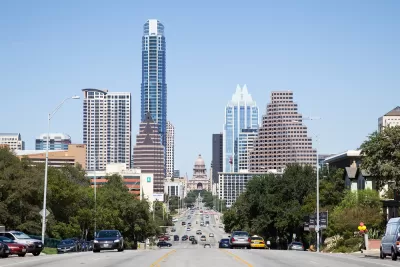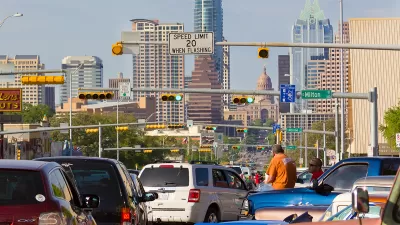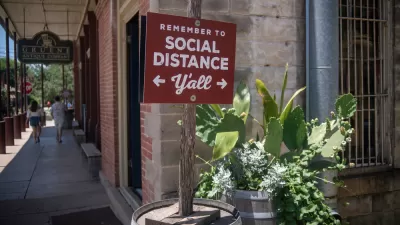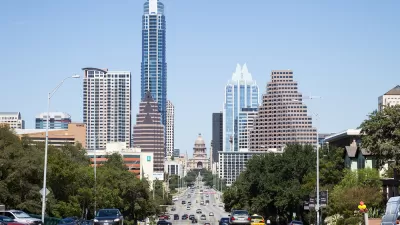Local groups are concerned that voting for the city of Austin's $720 million transportation bond will require a leap of faith.

Audrey McGlinchy reports on the $720 million scheduled for the November ballot in Austin, Texas. The controversy surrounding the bond concerns the ongoing uncertainty about exactly how and where the $720 million would be spent should voters approve the bond.
"Although $482 million of the bond’s total price tag has been set aside for changes to seven main roads, plus studies of two others, city staff has said that fully funding the corridor studies would cost closer to $1.5 billion," according to McGlinchy. "So, with less than a third of that amount in hand should the bond be approved by voters in November, staff and Council would still have to fund the rest piecemeal."
The bond, first announced in May and covered by Planetizen in June, is one of Mayor Steve Adler's signature initiatives. Adler's explanation for the uncertainty surrounding the bond is that a finalized list of corridor plans would cost too much and waste time.
However, Mayor Adler does promise that the bond will have guidance and checks and balances in place. McGlincy explains:
When City Council approved the bond, it also approved a set of guiding goals for staff, including addressing congestion and increasing transit options, such as infrastructure for buses and bikes. These, the mayor said, will be priority when staff decides which portions of Austin’s main roads deserve makeovers. Council will also have to approve each piece of spending with this bond money, meaning there will be a venue for at least some form of public input.
The article also shares the details of the Austin Neighborhoods Council's objections to the lack of detail regarding the bond.
FULL STORY: The leap of faith inherent in voting for the $720 million bond

Alabama: Trump Terminates Settlements for Black Communities Harmed By Raw Sewage
Trump deemed the landmark civil rights agreement “illegal DEI and environmental justice policy.”

Study: Maui’s Plan to Convert Vacation Rentals to Long-Term Housing Could Cause Nearly $1 Billion Economic Loss
The plan would reduce visitor accommodation by 25% resulting in 1,900 jobs lost.

Planetizen Federal Action Tracker
A weekly monitor of how Trump’s orders and actions are impacting planners and planning in America.

Wind Energy on the Rise Despite Federal Policy Reversal
The Trump administration is revoking federal support for renewable energy, but demand for new projects continues unabated.

Passengers Flock to Caltrain After Electrification
The new electric trains are running faster and more reliably, leading to strong ridership growth on the Bay Area rail system.

Texas Churches Rally Behind ‘Yes in God’s Back Yard’ Legislation
Religious leaders want the state to reduce zoning regulations to streamline leasing church-owned land to housing developers.
Urban Design for Planners 1: Software Tools
This six-course series explores essential urban design concepts using open source software and equips planners with the tools they need to participate fully in the urban design process.
Planning for Universal Design
Learn the tools for implementing Universal Design in planning regulations.
Caltrans
Smith Gee Studio
Institute for Housing and Urban Development Studies (IHS)
City of Grandview
Harvard GSD Executive Education
Toledo-Lucas County Plan Commissions
Salt Lake City
NYU Wagner Graduate School of Public Service





























